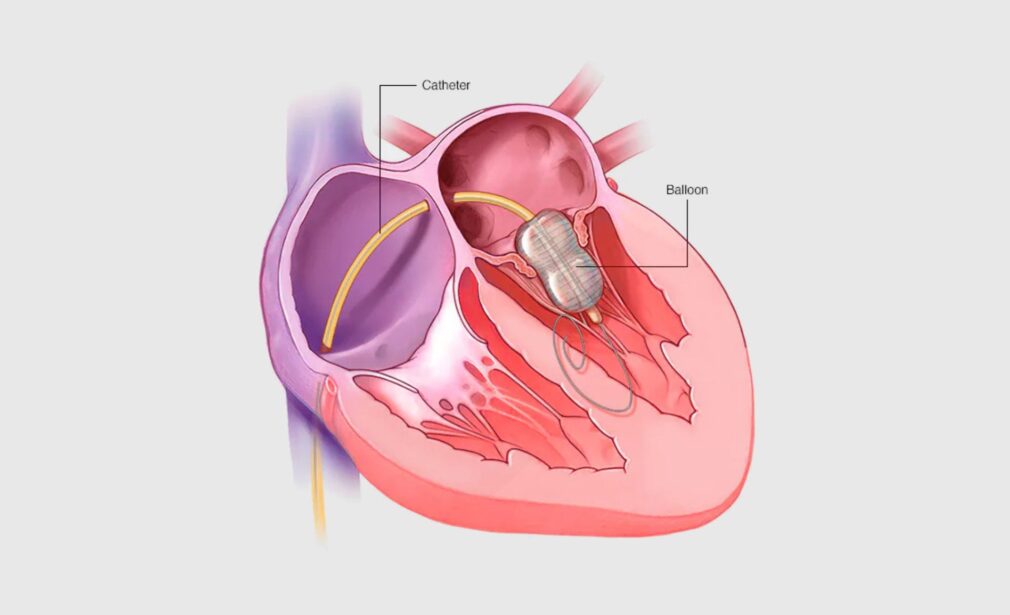Balloon Mitral Valvotomy in Mohali
What is Balloon Mitral Valvotomy?
Balloon Mitral Valvotomy (BMV), also called Balloon Mitral Valvuloplasty, is a minimally invasive heart procedure used to treat mitral valve stenosis – a condition where the heart’s mitral valve becomes narrowed, restricting blood flow from the left atrium to the left ventricle.
In Mohali, Dr. Honey Sharma, an experienced interventional cardiologist, performs balloon mitral valvotomy using advanced imaging and catheter-based techniques, ensuring precise and safe results for patients suffering from valve narrowing.
When is Balloon Mitral Valvotomy Needed?
Mitral valve stenosis can be caused by rheumatic heart disease, age-related changes, or congenital defects. Symptoms often develop slowly but can severely impact daily life.
Dr. Honey Sharma recommends BMV in Mohali for patients with:
Moderate to severe mitral valve narrowing
Shortness of breath during exertion
Fatigue and reduced exercise capacity
Swelling in legs or feet (edema)
Heart rhythm disturbances like atrial fibrillation
Recurrent chest discomfort
Benefits of Balloon Mitral Valvotomy
Minimally invasive – no open-heart surgery required
Quick recovery compared to valve replacement
Improves blood flow across the mitral valve
Reduces symptoms like breathlessness and fatigue
Lower complication rate when performed by an expert like Dr. Honey Sharma
The Balloon Mitral Valvotomy Procedure – Step by Step
1. Pre-Procedure Assessment
Detailed echocardiogram to assess valve condition
Blood tests and ECG
Discussion about risks, benefits, and expected outcomes
2. The Procedure
Performed under local anesthesia with sedation or general anesthesia
A thin catheter with a balloon at the tip is inserted via a vein (usually in the groin)
Guided to the heart using fluoroscopy and echocardiography
The balloon is positioned inside the narrowed mitral valve
The balloon is inflated to widen the valve opening, improving blood flow
3. Post-Procedure Care
Monitoring in the hospital for 24–48 hours
Follow-up echocardiogram to confirm results
Gradual return to normal activities within a week
Who is a Candidate for Balloon Mitral Valvotomy?
Ideal candidates for BMV in Mohali include:
Patients with pliable mitral valves and minimal calcification
Individuals without severe mitral regurgitation
Patients without large blood clots in the left atrium
Younger patients with rheumatic valve disease
Why Choose Dr. Honey Sharma for Balloon Mitral Valvotomy in Mohali?
Expertise in structural heart interventions
State-of-the-art cardiac cath lab in Sector 69, Mohali
High success rate with low complication risk
Personalized patient care before, during, and after the procedure
Convenient location for patients from Mohali, Chandigarh, Panchkula, and Zirakpur
Risks and Safety Measures
Balloon mitral valvotomy is generally safe, but like any procedure, it carries some risks:
Bleeding at the insertion site
Valve regurgitation (leakage)
Blood clots
Rare heart rhythm problems
Dr. Honey Sharma takes all necessary precautions, including advanced imaging, experienced support staff, and careful patient selection, to minimize risks.
Life After Balloon Mitral Valvotomy
Most patients experience dramatic improvement in symptoms
You can resume light activities within a week
Lifelong heart check-ups are recommended to monitor valve function
Heart-healthy lifestyle and medication (if needed) help maintain results
Comparison: Balloon Mitral Valvotomy vs. Mitral Valve Replacement
| Feature | BMV | Valve Replacement |
|---|---|---|
| Invasiveness | Minimally invasive | Open-heart surgery |
| Recovery Time | 1–2 weeks | 6–8 weeks |
| Hospital Stay | 1–2 days | 5–7 days |
| Suitable For | Select cases of valve narrowing | Severe damage or calcification |
Frequently Asked Questions (FAQs)
1. Is balloon mitral valvotomy painful?
No, it’s performed under anesthesia, so you won’t feel pain during the procedure.
2. How long does the procedure take?
Typically 1–2 hours, with a short hospital stay.
3. Can the mitral valve narrow again after BMV?
Yes, in some cases, narrowing can recur after several years, especially with rheumatic heart disease.
4. Is BMV available in Mohali?
Yes, Dr. Honey Sharma offers advanced balloon mitral valvotomy in Mohali with top-class facilities.
5. Can elderly patients undergo BMV?
Yes, if they meet the medical criteria and have suitable valve anatomy.
6. Do I need lifelong medication after BMV?
Some patients may need medications to manage heart rhythm or prevent clots.
7. What’s the success rate of BMV?
When performed on suitable patients, the success rate is over 90%.
8. Is the procedure covered by insurance?
Many insurance providers cover BMV. Check with your provider for details.
9. Can I travel after the procedure?
Yes, after recovery and follow-up clearance from Dr. Sharma.
10. Is it safe for pregnant women?
In select cases, BMV can be safely performed during pregnancy to relieve symptoms.
Book Your Balloon Mitral Valvotomy Consultation in Mohali
If you have mitral valve stenosis and want to avoid open-heart surgery, balloon mitral valvotomy might be the right choice for you.

